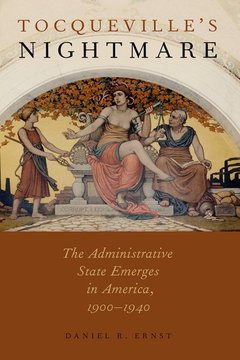Description
Tocqueville's Nightmare
The Administrative State Emerges in America, 1900-1940
Author: Ernst Daniel R.
Language: English
Subjects for Tocqueville's Nightmare:
Publication date: 05-2016
240 p. · 15.6x23.2 cm · Paperback
240 p. · 15.6x23.2 cm · Paperback
Description
/li>Biography
/li>
Alexis de Tocqueville once warned that "insufferable despotism" would prevail if America ever acquired a national administrative state. Today's Tea Partiers evidently believe that Tocqueville's nightmare came true during the New Deal when radicals created vast bureaucracies that continue to trample on individual freedom. In Tocqueville's Nightmare, Daniel R. Ernst destroys this ahistorical and simplistic narrative. He shows that reformers wanted to purge government of corruption rather than create a socialist utopia. Indeed, they built the principles of individual rights, limited government, and due process into the administrative state. Far from following "un-American" models, they rejected the leading European scheme for constraining government, the Rechtsstaat (a state of rules). They instead equated the rule of law with the rule of courts and counted on judges to review the bases for administrators' decisions. But when leading judges realized that strict judicial review shifted to them decisions best left to experts, even they decided that a "day in court" was unnecessary if individuals had already had a "day in commission" where the fundamentals of due process prevailed. This procedural notion of the rule of law solved the judges' puzzle of reconciling bureaucracy and freedom. The American administrative state is a restrained and elegant solution to a thorny problem and has kept Tocqueville's nightmare at bay.
Daniel R. Ernst has been a member of the faculty of the Georgetown University Law Center since 1988. His first book, Lawyers against Labor, won the Littleton-Griswold Award of the American Historical Association. He has been a John Simon Guggenheim Memorial Foundation Fellow, a Fulbright Research Scholar at the National Library of New Zealand, and a co-editor of "Studies in Legal History" a book series sponsored by the American Society for Legal History. He writes on the political history of American legal institutions.
© 2024 LAVOISIER S.A.S.



